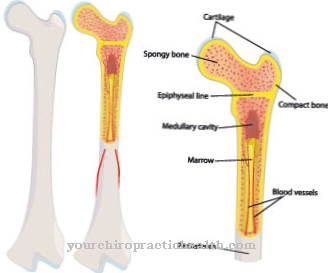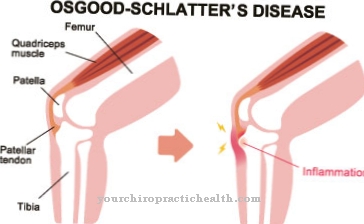Fecal incontinence or anal incontinence, in the technical term anorectal incontinence, is the inability to control bowel movements or intestinal gases, which occurs in all age groups, and leads to spontaneous, involuntary emptying of the bowel. This illness, which can occur in three degrees of severity, is associated with high psychosocial stress and requires extensive therapeutic measures.
What is fecal incontinence?

© Nenad - stock.adobe.com
The anorectal incontinence is divided into three degrees of severity: In the first degree, the mild stage, intestinal winds go out in an uncontrolled manner.
Affected persons of the second, middle, degree cannot hold any thin intestinal contents and in the third, the severe, stage there is a complete loss of control over bowel evacuation, even solid stool can no longer be held back.
The classification into degrees of severity neglects important aspects of fecal incontinence such as the frequency of uncontrolled bowel movements and social problems of those affected. So far, no precise classification has been made that takes these aspects into account.
Around three percent of the German population of all ages suffer from faecal incontinence, with a significant increase in old age and women. A related childhood disease is encopresis, the repeated, voluntary or involuntary defecation from the age of 4.
causes
Fecal incontinence has numerous causative factors, several of which must come together to trigger the disease. If only one mechanism that controls bowel movements fails, the body has sufficient compensation mechanisms to prevent fecal incontinence.
The most common causes are:
Damage to the anus sphincter, for example through the perineal tear, after surgical interventions, for example fistula or hemorrhoid operations, and through "slipping out" of the anal canal or rectum from their natural position. Pelvic floor weakness can also be one of the causes. This is caused by excessive weight, weak muscles and connective tissue and can occur after birth. Bowel diseases, like Crohn's disease, can also trigger anorectal incontinence.
Fecal incontinence can also occur in the event of nerve damage from strokes, major pelvic operations, herniated discs, paraplegia or medication.
A rare cause is psychological problems such as traumatic experiences and psychosis. Laxative abuse can also cause fecal incontinence. Finally, patients with dementia are also often affected by this burden.
Symptoms, ailments & signs
The main symptom of fecal incontinence is an inability to hold intestinal gases and stool in the rectum arbitrarily. Characteristic signs of the disease are repeated involuntary loss of stool ("stool accidents"), underwear contaminated with feces, a general inability to control the passage of gas and the uncontrolled opening of the bowel.
Depending on the specific form of fecal incontinence, the disease can make itself felt in different ways. In the case of sensory fecal incontinence, those affected do not notice the urge to defecate. People with urge incontinence notice the urge to defecate, but are unable to control it and must hurry to make it to a toilet in time.
Often the consistency of the stool is crucial. Around half of those affected simply cannot hold soft and mushy stools. One-third will experience this inability even if the stool is firm. In many cases, faecal incontinence occurs in combination with constipation.
Those affected also often suffer from severe abdominal pain, gas and bowel movements, which can take a long time. Overflow incontinence also rarely occurs, in which the affected person suffers from constipation but still has diarrhea that is pushed past the hard stool.
Diagnosis & course
The diagnosis of the Fecal incontinence takes place in a detailed anamnesis of the beginning of the complaint, accompanying circumstances and existing diseases by a proctologist. This is followed by a rectal examination of the rectum in order to determine possible changes.
If further examination is required, the proctologist will arrange for a proctoscopy of the anal canal or rectoscopy of the rectum. The colonoscopy may also be necessary to mirror the entire intestine, but is rarely used due to the high expenditure.
During the mirroring, the doctor can take tissue samples from the intestinal mucosa and / or smears from the anal mucosa and assess them microscopically. The sphincter function can be determined electronically by measuring the pressure. Imaging techniques may be useful, including X-ray examination of the rectum using contrast agents.
Complications
Faecal incontinence leads to complications, especially on the psychological level. For example, the unwanted discharge of intestinal winds and feces often leads to those affected isolating themselves socially. They stop participating in activities and avoid social events. At the same time, many of those affected hide their suffering from their environment or their doctor, which in the case of organic causes can mean that a possible treatment is no longer effective at a certain point.
If hemorrhoids, colitis or other infections and abscesses in the corresponding area are the cause of fecal incontinence, prolongation can lead to an expansion of the inflammation and even complete destruction of the tissue. Surgical measures to treat fecal incontinence involve the usual risks of complications during or after an operation.
In addition, it should be mentioned that measures aimed at an operative change in the anus (using own tissue or a "STARR" implant, for example) can lead to pain and inflammation of the anus or intestines. Bleeding can also occur. Further complications in connection with fecal incontinence result from the multitude of possible ailments that come into question as the cause. The corresponding disease is to be considered here.
When should you go to the doctor?
In the event of persistent or recurring defecation disorders, a medical check-up should take place. If there is constipation, diarrhea or blood in the stool, action must be taken. If bowel evacuation cannot be voluntarily regulated, there is a disorder that should be investigated and treated. A diagnosis is necessary so that an individual treatment plan can be drawn up. If a spontaneous bowel movement occurs during the day or during sleep, a visit to a doctor is advisable.
If the causes lie in an improper diet, the use of medication or if the person concerned suffers from a severe experience of stress, the observations should be discussed with a doctor. Any abnormalities and peculiarities that occur immediately before the sudden bowel evacuation should be documented and presented to the doctor. A decrease in well-being and an increase in psychological resilience are signs of impaired health. If the symptoms persist for several weeks or months, the person concerned needs a medical examination.
Reduced sexual activity, interpersonal problems or withdrawal behavior on the part of the person concerned are indications of irregularities. There may be physical illnesses that need to be clarified. Flatulence or unpleasant body odors are other signs that should be investigated. If you experience severe abdominal pain or abdominal discomfort, a doctor's visit is also necessary.
Treatment & Therapy
The cause of the anorectal incontinence determines their therapy. A healthy diet with regulation of bowel movements is also advisable in order to regain control through regular bowel movements. At this point, the administration of laxatives at a certain time and toilet training also come into play. This is kept over several weeks and with the help of a stool diary and is intended to get the bowels and patients used to regular, controllable bowel movements.
Operations may be necessary if the sphincter muscle is inoperable. Either the patient is given an artificial or endogenous sphincter replacement or an artificial anus is placed.
Modern sacral nerve stimulation is very promising for neural causes. Here, the sphincter is stimulated by a pacemaker in such a way that it contracts and holds back the stool and evacuations only take place at appropriate times.
Therapy also includes incontinence care with aids to prevent laundry and clothing from being soiled. For example, diapers, incontinence pants, anal tampons or stool bags are used for immobile patients according to individual criteria and requirements.
prevention
There are few preventive measures against that Fecal incontinence. Pelvic floor exercises are not only useful during and after pregnancy and childbirth, they are generally recommended regardless of gender. On the one hand, it has a preventive effect, but on the other hand it can also address functional causes of fecal incontinence.
Aftercare
Faecal incontinence can be effectively countered with pelvic floor exercises - the muscles in the anal and pelvic areas can be specifically strengthened via pelvic floor exercises. The pelvic floor training shows good results, especially in patients with weak connective tissue, but also in women after multiple births. Vaginal cones can be used to train the pelvic floor muscles.
A change in toilet habits, so-called toilet training, can also provide relief - with specific behavioral therapy techniques, for example by introducing regular times to use the toilet. In addition, biofeedback is an effective measure in the fight against faecal incontinence: Here, the person concerned learns to consciously perceive his sphincter muscle tension and to control it accordingly.
For this purpose, a small balloon is inserted into the anal canal. This causes the patient to contract the sphincter muscle. A signal indicates as soon as a certain pinch pressure has been set. The biofeedback training is based on an individually designed exercise plan and helps many patients. Another method is electrical stimulation: Here a weak current flow, a stimulus current, helps to stimulate the sphincter - the latter is passively tensed in this way.
However, noticeable effects only appear after a few weeks. That means: the patients need stamina. And last but not least, a change in diet helps in many cases, for example increasing the intake of high-fiber foods. This increases the volume of the stool and normalizes the consistency of the stool.
You can do that yourself
Pelvic floor exercises are recommended for faecal incontinence. The daily training of the pelvic floor muscles strengthens the connective tissue and the muscles. In the best case scenario, this will improve the ability to hold stool.
Establishing regular toilet times is part of good "toilet training". If the patient knows when he is feeling the urge, he can adjust his everyday life accordingly. In biofeedback, the patient is aware of his or her sphincter tension. The individually defined exercise plan can be carried out by the patient at home. In addition, electrical stimulation of the sphincter function is possible. A weak flow of current stimulates the tension in the sphincter.
Immediately after an intervention on the sphincter muscle, rest and rest. Operations such as the colostomy or the prolapse operation place greater stress on the body and especially the gastrointestinal tract. The patient should stick to the prescribed diet and not subject the sphincter muscle to unnecessary stress until the symptoms have been completely cured.Finally, patients must adhere to the medically prescribed measures and carefully monitor the symptoms. The more extensively the disease is studied, the more specifically the patient can take action against it himself.






.jpg)

















.jpg)



